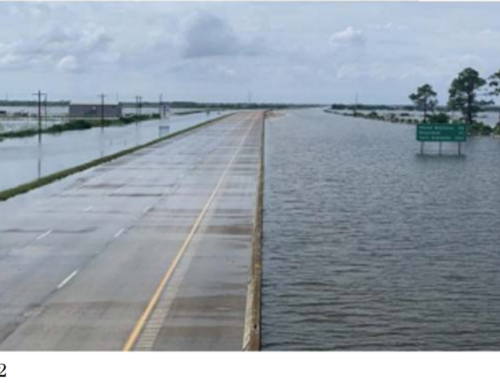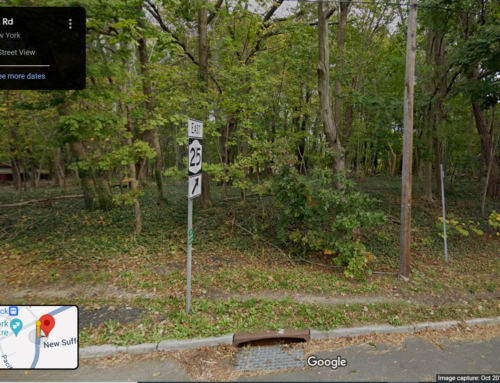The Virginia General Assembly passed two major eminent domain bills in its most recent term, the ominous Senate Bill 666, and the less ominously numbered but significantly more extensive Senate Bill 694. Condemning authorities, consultants, and their counsel need to be aware of these changes and to update their best practices, procedures, forms, and checklists to address the changes from these two bills. Where the bill language is provided as a quote, stricken language is in red and added language is in green.
MORE CHANGES TO LOST ACCESS AND LOST PROFITS.
The definitions of “lost access” and “lost profits” in Section 25.1-100 have been changed yet again. 2022 Va. SB 694 changed the definition of lost access as follows:
“Lost access” means a
material impairment of directchange of vehicular or pedestrian access to property, a portion of which has been taken or damaged as set out in subsection B of § 25.1-230.1. This definition of the term “lost access” shall not diminish any existing right or remedy, and shall not create any new right or remedy other than to allow the body determining just compensation to consider a change in access in awarding just compensationthat is caused by a public use project for which the eminent domain power has been exercised against the property and which results in a diminution in the value of the property.
2022 Va. SB 666 changed the definition of lost profits as follows:
“Lost profits” means a loss of
businessprofits, as defined in § 25.1-230.1, that is sufferedor expected profits suffered by a business or farm operation as a result of a taking or damaging of the property on whichathe business or farm operationis located, subject to adjustment using generally accepted accounting principles consistently applied, from a business or farm operationoperated for a period not to exceed three years from the later of (i) the date of valuation or (ii) the date the state agency or its contractor prevents the owner from using the land or any of the owner’s other property rights are taken. Thepersonbusiness or farm operation claiming lost profits is entitled to compensation whether part of the property or the entire parcel of property is taken. In order to qualify for an award of lost profits, one of the following conditions shall be met: (a) the business is owned by the owner of the property taken, or by a tenant whose leasehold interest grants the tenant exclusive possession of substantially all the property taken, or (b) the farm operation is operated by the owner of the property taken, or by a tenant using for a farm operation the property taken, to the extent that the loss is determined and proven pursuant toor damaged, and bears the burden of proving lost profits in accordance with the requirements of subsection C of § 25.1-230.1.This definition of the term “lost profits” shall not create any new right or remedy or diminish any existing right or remedy other than to allow the body determining just compensation to consider lost profits in awarding just compensation if a person asserts a right to lost profits in a claim for compensation.
The specific lost access and lost profits code section, Va. Code 25.1-230.1, was also changed again this year These changes are in 2022 Va. SB 666. In line with the change to the definition of lost profits in 25.1-100, the definition of “Business profit” was deleted from Va. Code 25.1-230.1(A). Va. Code 25.1-230.1(C) was changed as follows:
C. The body determining just compensation shall include in its determination of just compensation lost profits to the owner of a business or farm operation conducted on the property taken
onlyor damaged if the owner or the business or farm operation proves with reasonable certainty the amount of the loss and that the loss is directly and proximately caused by the taking or damaging of the property through the exercise of eminent domain and the following conditions are met …
Va. Code 25.1-230.1(F), dealing with intervention in condemnation proceedings and bifurcation of lost profits proceedings was also slightly modified:
Additionally, unless already named in the petition for condemnation, the owner of the business or farm operation may intervene in the proceeding by filing a motion to intervene accompanied by a petition for intervention setting forth the basis for the lost profits claim under this chapter. Proceedings to adjudicate lost profits may, upon motion of the owner of the business or farm operation, be bifurcated from the other proceedings to determine just compensation
if the lost profits claim period will not expire until one year or later from the date of the filing of the petition for condemnation, but such bifurcation shall not prevent the entry of an order confirming indefeasible title to the land interests acquired by the condemning authority.
Va. Code 25.1-2301(G) was also changed as follows:
G. Nothing in this section is intended to provide for compensation for inverse condemnation claims for lost profits or lost access for temporary interference with or interruption of a business or farm operation
other than that which is directly and proximately caused by a taking or damaging of property through the exercise of eminent domainwhere the impact to the property is for a period of fewer than seven days.
BONA FIDE OFFER NOW INVOLVES COPIES OF TITLE DOCUMENTS.
Condemnors were already required under the existing version of Va. Code 25.1-204 to conduct a title search of the property and to provide the owner with a copy of the title report. The General Assembly updated Va. Code 25.1-204 by adding a specified time period for the title report. Now, the title examination must go back at least sixty years. However, since a 60-year title search was already common practice, this may not be a significant change for many condemnors, although it will be for those that were only performing so-called “current owner” searches. What will be a significant change for many and one that will require significant additional labor on behalf of the condemning authorities, is that in addition to providing a copy of the title report, the condemnor must now also under Va. Code 25.1-204
(ii) provide to such owner or owners a copy of the report
of status of titleshowing the examination of title; and (iii) provide to such owner or owners a copy of all recorded instruments within the 60-year title history of such property, including all deeds of trust, releases, liens, deeds, or other instruments identified in the report.
These changes are contained in 2022 Va. SB 694.
COURT TO PLACE FUNDS IN AN INTEREST-BEARING ACCOUNT.
Va. Code 25.1-237, 25.1-308, 25.1-315, and 33.2-1019 have been amended to specifically provide that in the various instances in which funds are deposited with the court, that the funds are to be placed by the clerk in an interest-bearing account. Most courts were already doing this, but some were not, so these minor changes clean up what was an unnecessary various between different courts.
INCREASE IN SURVEY COSTS.
Va. Code 25.1-245.1 was amended to increase the amount that the condemnor is to pay for survey costs, making the language more open ended, and likely setting up an additional subordinate fight about reasonableness of costs and fees for survey work that often just will not be done by the landowner:
B. The court
may in its discretion tax as a cost a fee, not to exceed $1,000,shall order the condemnor to pay to the owner reasonable costs and fees, not to exceed $7,500, unless the court approves a higher amount, for a survey for thelandownerowner.
Condemning authorities and their should keep an eye out for an attempted double recovery on this one, since landowner appraisers regularly tack on the cost of “adjusting property pins” as an alleged cost to cure regardless of whether it is required, and landowner counsel will probably will still try to recover costs under this statute even though already included in their appraisal.
NEW PROCEDURE: TEMPORARY CONSTRUCTION EASEMENT EXPIRATION DATES.
In a significant change which is going to require condemning authorities, consultants, and their counsel to change their forms, temporary construction easements in Certificates of Take must now include an expiration date for the TCE or a certification that the date is unknown. A sentence was added to Va. Code 25.1-307(A) that “If a temporary construction easement is being acquired, the certificate shall set forth the calendar date on which it shall expire if that date is known to the condemnor. If the condemnor certifies that such date is not known, at such time the condemnor ascertains the date, the condemnor shall file certification of the information as provided by subsection B and shall simultaneously provide the landowner or the landowner’s counsel, if any, a copy of such certification.”
This sentence is poorly drafted, although it seems like what the drafters intended to happen may be discernible. The drafting becomes even worse in the version of the sentence inserted into Va. Code 33.2-1022 which provides “If a temporary construction easement is being acquired, the certificate shall set forth the calendar date on which it shall expire, if such date is known or can be reasonably estimated, or, if certified that such date is not known, at such time the date is ascertained, the Commissioner of Highways shall file certification of the information as provided by subsection B of § 25.1-307 and shall simultaneously provide the landowner or the landowner’s counsel, if any, a copy of such certification.”
Subsection B of 25.1-307 was not changed and does not provide for any such certification. It provides “B. The authorized condemnor shall record a certificate of take or a certificate of deposit in the clerk’s office of the court where deeds are recorded. The clerk shall record the certificate in the deed book and index it in the names of both (i) the person or persons who owned the land before the recordation of the certificate and (ii) the authorized condemnor.”
Therefore, this clumsy sentence and cross-reference could probably have said that within [a reasonable time] after the condemning authority determines the date on which the temporary construction easement will expire, the condemning authority will prepare a certification stating the date on which the temporary construction easement will expire, and shall record such certification and provide notice of such recordation in the same manner as provided for the certificate of take or certificate of deposit to which said certification relates. Of course, that is not what the statute actually says, and as usual, the code section as written does not provide for what happens if the terms of its poorly written language are not met.
NEW PROCEDURE: CERTIFICATES OF COMPLETION.
SB 694 also includes a new code section Va. Code 25.1-319, Certificates of completion. This is an entirely new procedure which the condemning authority side will have to add to their forms and checklists. The new section provides as follows:
§ 25.1-319. Certificates of completion.
Upon completion of construction of any public use project for which a portion of private property was acquired by certificate, the condemnor shall, within 90 days of completion of construction, record a certificate of completion in the clerk’s office of the court where deeds are recorded. Such certificate of completion shall state that construction of the public use project for which the property was taken is complete and any temporary acquisitions have terminated. The clerk shall record the certificate of completion in the deed book and index in it the names of both (i) the person or persons who own the land at the time of the recordation of the certificate of completion and (ii) the condemnor.
Again, nothing is specified as to what happens if this is not done. Also, despite the changes referenced above about separate certification of the date a temporary construction easement will expire, there is no language in this new section to link those two processes, therefore it is unclear whether completion of the procedure in Va. Code 25.1-319 satisfies the terms of Va. Code 25.1-307(A) and Va. Code 33.2-1022.
PETITION BY OWNER FOR DETERMINATION OF JUST COMPENSATION.
SB 694 repeals existing Va. Code 33.2-1029 and replaces it with new Va. Code 33.2-1029.1, which provides as follows:
§ 33.2-1029.1. Petition by owner for determination of just compensation.
A. The owner of property that the Commissioner of Highways has entered and taken possession of, or taken defeasible title of, pursuant to the provisions of this chapter may petition the circuit court of the locality in which the greater portion of the property lies for the appointment of commissioners or the empanelment of a jury to determine just compensation for the property taken and damage done, if any, to such property, as provided in Chapter 2 (§ 25.1-200 et seq.) of Title 25.1 if (i) the owner and the Commissioner of Highways have not reached an agreement as to compensation and damages, if any, and (ii) the Commissioner of Highways:
1. Has not completed the construction of the contemplated improvements upon the property after a reasonable time for such construction has elapsed; or
2. Has not instituted condemnation proceedings within:
a. Sixty days after completion of the construction of the contemplated improvements upon the property;
b. One hundred and eighty days after the Commissioner of Highways has entered upon and taken possession of the property, regardless of whether the construction of the contemplated improvements has been completed; or
c. One hundred and eighty days after the recordation of a certificate.
B. A copy of such petition shall be served on the Commissioner of Highways at least 10 days before it is filed in the court. The Commissioner of Highways shall file an answer within five days after the filing of the petition. If the courts finds that the conditions prerequisite for such appointment as provided in subsection A are satisfied, the court shall appoint commissioners or empanel a jury, as requested in the owner’s petition, to ascertain the amount of compensation to be paid for the property taken and damages done, if any. The proceedings shall thereafter be governed by the procedures prescribed in Chapter 2 (§ 25.1-200 et seq.) of Title 25.1 insofar as they may be applicable, except that the owner shall have the burden of proceeding with the evidence as to just compensation. The Commissioner of Highways shall reimburse the owner for his fees and costs charged by the lienholder, including filing fees and attorney fees, incurred in filing the owner’s petition.
The new law also contains a provision regarding the burden of proof and assignment of costs. § 33.2-1029.1(B) explicitly provides that if the landowner petitions the court for a determination of just compensation, then the landowner carries the burden of proving the just compensation. The law further states that the Commissioner of Highways shall reimburse the landowner for “fees and costs charged by the lienholder, including filing fees and attorney fees, incurred in filing the owner’s petition.” This language was proposed to permit landowners to recover certain costs that a mortgage lender charges a landowner to release the lender’s claim on the eminent domain proceeds. However, the language as adopted—that the landowner may recover costs and fees “charged by a lienholder . . . incurred in filing the owner’s petition”—is purposeless because the landowner is the party who files the petition. The lienholder, on the other hand, typically charges a fee to consider a request to release the lien. That fee is not “incurred in filing the owner’s petition,” and thus is not covered by the statute.
MODIFICATION TO CONDEMNATION AUTHORITY OF LOCALITIES.
Va. Code Section 15.2-1901, which addresses the condemnation authority of localities, was changed as follows:
C. Notwithstanding any other provision of law, general or special, no locality shall condition or delay the timely consideration, advancement, or approval of any application for or grant of any permit or other approval for any real property over which it enjoys jurisdiction for the purpose, expressed or implied, of allowing the
locality to condemncondemnation orotherwise acquireacquisition of the property or to commence any process to consider whether to undertake condemnation or acquisition of the property.
This change is contained in 2022 Va. SB 694.
Ross Greene is a firm shareholder and chair of the firm’s Eminent Domain / Right of Way Practice Group. He focuses his practice in the areas of eminent domain, right of way, real estate, wills, trusts, estates, and business matters.
Editor’s Note: This legislative update was put together with the assistance of our summer associate Nicole Pasho.







Leave A Comment